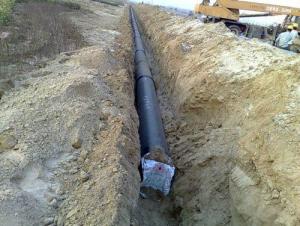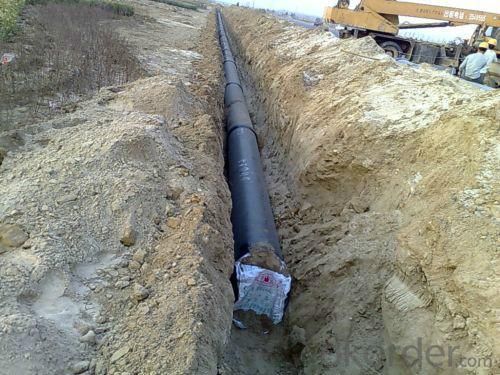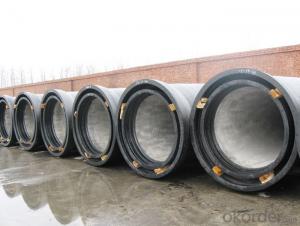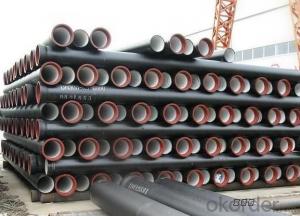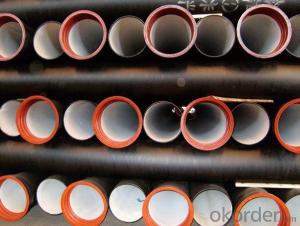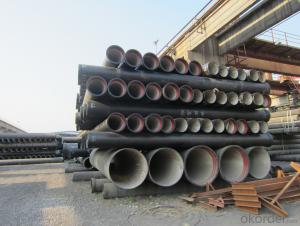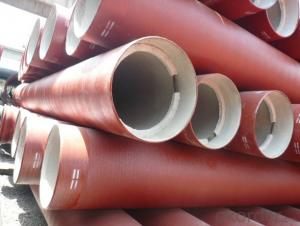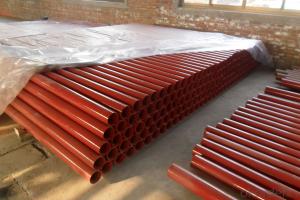Ductile Iron Pipe EN545/EN598/ISO2531 Potable Water
- Loading Port:
- China main port
- Payment Terms:
- TT or LC
- Min Order Qty:
- 10000 m.t.
- Supply Capability:
- 200000 m.t./month
OKorder Service Pledge
OKorder Financial Service
You Might Also Like
1.Ductile Iron Pipe Description :
1) Pipes confirm to ISO2531,K9 class,T type joint,6m long,with inside cements lining conform to ISO4179,outside Zinc
spraying(130g/m2) and bitumen coating(70μm) conform to ISO8179.
2) Pipe ends: Spigot and socket ends, with 100% SBR rubber gaskets accoding to ISO4633
3) we can do third party inspection according to customer's request.
4) Our products have been sold to many international market, such as Middle East and South East Asia and Africa.
2.Main Features of the Ductile Iron Pipe:
1. Material: Ductile iron grade 500-7/ 450-10 in accordance with ISO1083
2. Standard: ISO 2531, EN545, EN598, ANSI, AWWA
3. Certificate: ISO9001, ISO14001, SGS, NSF, WRAS
4. Test: In accordance with ISO 2531 / EN 545 / EN598 and 100% water pressure test
5. Length: 6m or cut into 5.6m, 5.7m, 5.8m
6. Rubber: NBR, SBR, EPDM according to ISO4633 / EN681.1
3.Ductile Iron Pipe Images:
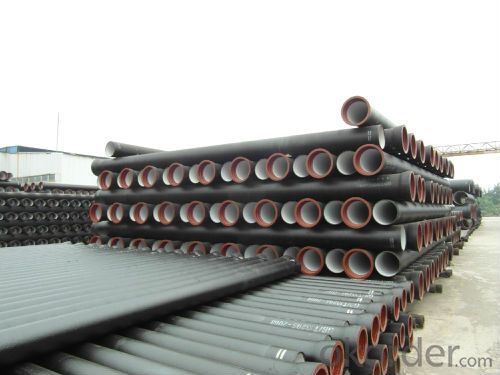
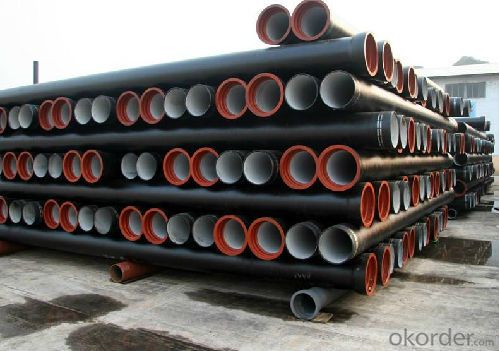
4.Ductile Iron Pipe Specification
Surface Finishes: Bare, Oiled, Mill Varnish, Galv,FBE, FBE Dual, 3LPE, 3LPP, Coal Tar,Concrete Coating and Tape Wrap
End Finishes: Beveled, Square Cut, Threaded, hat
Additional Services: Internal Coating
Packaging: packed in bag, plastic bag, steel strip, steel wire,double wire, iron box, wooden box, tarpaulin, plastic
sheeting
Inspection: MOODY SGS BV GL DNV ABS LIOYD’S
Test: X-ray, UT, magnetic particle,inspection,hydrostatic test.
Processing service: Beveling, Threading, Slotting, Cut-to length, Bends, Quench and Temper, Fabrication, Double-jointing
and On-site assistance
Documentary: MTC, material certification,Origin certification, CI or PI,Test Report, export licence, handling order,
B/L,insurance policy,shipping instructions, contract, packing list etc.
5.FAQ:
We have organized several common questions for our clients,may help you sincerely:
1.Q: Why would you choose ductile iron pipe rather than other pipe materials?
A:The reasons are obvious for that not only ductile iron pipe possesses the inherent strength and flexibility of ductile
iron, combined with proven corrosion protection systems, but also the cost savings can be achieved from design to
installation and commissioning.
2.Q:Why can you guarantee the inner of pipes can’t be corroded?
A: High alumina cement mortar lining and sulphate-resistant cement mortar lining. These two special linings are applicable
to inner anti-corrosion for sewage pipes, improving resistance to erosion of the sewage components.
- Q: How does ductile iron pipe perform in high-temperature environments?
- Ductile iron pipe performs well in high-temperature environments due to its superior strength and thermal resistance. It can withstand elevated temperatures without significant deformation or structural damage, making it a reliable choice for various applications requiring high-temperature resistance.
- Q: Can ductile iron pipe be used for horizontal directional drilling?
- Yes, ductile iron pipe can be used for horizontal directional drilling (HDD). It is a commonly used material due to its durability and strength, making it suitable for HDD applications where trenchless installation is required.
- Q: Are ductile iron pipes suitable for power plant cooling systems?
- Yes, ductile iron pipes are suitable for power plant cooling systems. Ductile iron pipes offer excellent strength, durability, and corrosion resistance, making them ideal for handling high temperature and high-pressure water flows commonly found in power plant cooling systems. Additionally, their flexibility and ease of installation make them a cost-effective choice for such applications.
- Q: How does ductile iron pipe perform in areas with high soil erosion?
- Ductile iron pipe performs well in areas with high soil erosion due to its inherent strength and durability. Its thick walls and strong composition make it resistant to external pressures, including the erosive forces of soil. The pipe's ability to withstand the effects of soil erosion helps ensure its long-term performance and reliability in such challenging environments.
- Q: Are ductile iron pipes resistant to seismic events?
- Generally, ductile iron pipes exhibit resistance to seismic events. Ductile iron, a form of cast iron known for its strength and durability, can withstand external forces, including those induced by seismic events like earthquakes. The design of ductile iron pipes allows for flexibility, enabling them to absorb and dissipate energy from seismic waves. This flexibility ensures the pipes remain intact despite ground movements and vibrations, preventing any breakage or cracking. Moreover, the joints of these pipes are designed to offer some level of flexibility, further enhancing their ability to withstand seismic events. Furthermore, the construction of ductile iron pipes involves thick walls, providing them with exceptional structural integrity. This strength reduces their susceptibility to damage during seismic events and ensures a consistent flow of fluids, such as water, even in extreme conditions. Nonetheless, it is crucial to recognize that the resistance of ductile iron pipes to seismic events can depend on various factors. These factors include the magnitude and proximity of the earthquake, the quality of installation and maintenance, and the specific design considerations for the pipeline system. Consequently, it is vital to adhere to proper engineering and construction practices to optimize the resilience of ductile iron pipes in areas prone to seismic activity.
- Q: How to control mortar proportioning in ductile iron pipe cement coating
- The calculation steps are: first to calculate the amount of plastering engineering (area), and then check the "national construction basic quota" quota in the corresponding amount of mortar project, engineering quantity multiplied by the amount of mortar that fixed amount of mortar, the mortar amount multiplied by the corresponding mix ratio of mortar, the consumption of raw materials can be obtained.
- Q: Are there any specific standards or specifications for ductile iron pipes?
- Yes, there are specific standards and specifications for ductile iron pipes. The most commonly used standards for ductile iron pipes are set by the American Water Works Association (AWWA) and the International Organization for Standardization (ISO). The AWWA standard for ductile iron pipes is known as AWWA C151. This standard covers the design, manufacturing, testing, installation, and maintenance requirements for ductile iron pipes used in water and wastewater applications. It specifies the materials, dimensions, and mechanical properties of the pipes, as well as the required coatings and linings. Similarly, the ISO standard for ductile iron pipes is ISO 2531. This standard provides guidelines for the design, manufacturing, testing, and installation of ductile iron pipes for water and wastewater systems. It covers various aspects such as dimensions, mechanical properties, coatings, and linings. In addition to these two widely recognized standards, there may be other regional or national standards specific to certain countries or regions. These standards often align with the AWWA and ISO standards or may have additional requirements specific to local conditions or regulations. Compliance with these standards ensures that ductile iron pipes meet the necessary quality and performance requirements. It also facilitates the interoperability and compatibility of ductile iron pipes across different systems and countries, enabling reliable and efficient water distribution and wastewater management.
- Q: Why does the cast iron pipe always run off when testing?
- The pipeline is installed, straight section of each pipe will be added pier, concrete pipe, elbow, three links should also have concrete pier, specific installation method according to GB Atlas 03SS515, and the straight pipe to soil, pipeline interface will be exposed, easy to check.
- Q: Can ductile iron pipe be used for hydropower systems?
- Ductile iron pipe is perfectly suitable for hydropower systems. It is renowned for its robustness, longevity, and ability to resist corrosion, making it an excellent option for numerous applications, including hydropower systems. The remarkable tensile strength of ductile iron enables it to endure the immense pressure and heavy loads associated with such systems. Additionally, its resistance to corrosion makes it ideal for use in water environments, ensuring a lengthy lifespan and minimal maintenance requirements. Consequently, ductile iron pipe can effectively serve hydropower systems by offering a dependable and efficient solution for water transportation and infrastructure support.
- Q: What is the expected flow capacity of ductile iron pipes?
- The flow capacity of ductile iron pipes can vary depending on several factors, including the diameter and wall thickness of the pipe, the type of fluid being transported, and the specific design and condition of the pipeline system. It is well-known that ductile iron pipes have a high flow capacity due to their smooth internal surface, which minimizes frictional losses. They are designed to handle a wide range of fluid flows, including water, sewage, and industrial fluids. To determine the specific flow rates, the Manning's equation is commonly used. This equation takes into account the hydraulic radius, slope of the pipe, and Manning's roughness coefficient to calculate the expected flow capacity of open channels and pipes. However, it's important to consider other factors that can affect the actual flow capacity. These factors include the presence of fittings, valves, and bends in the pipeline, as well as any potential blockages or obstructions. To accurately determine the expected flow capacity of ductile iron pipes for a particular application, it is recommended to consult the manufacturer's specifications, engineering guidelines, or work with a qualified engineer.
Send your message to us
Ductile Iron Pipe EN545/EN598/ISO2531 Potable Water
- Loading Port:
- China main port
- Payment Terms:
- TT or LC
- Min Order Qty:
- 10000 m.t.
- Supply Capability:
- 200000 m.t./month
OKorder Service Pledge
OKorder Financial Service
Similar products
Hot products
Hot Searches
Related keywords
